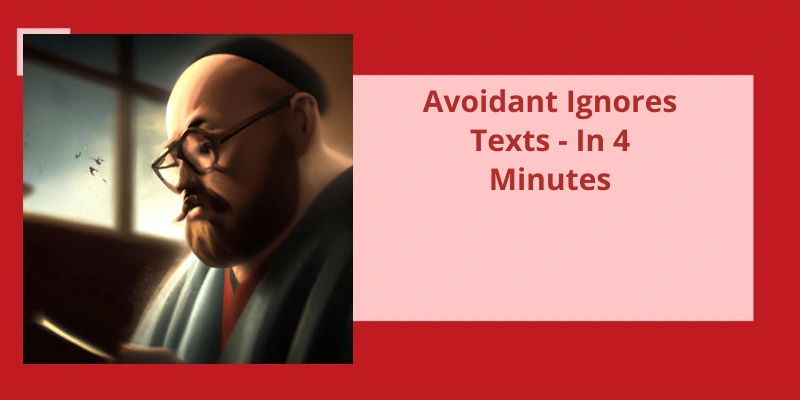Avoidant behavior is a type of behavior that involves avoiding social interaction and contact with others. This type of behavior can manifest itself in many ways, including ignoring texts. When someone ignores texts, they are essentially avoiding communication with the sender. This type of behavior can be frustrating and hurtful for the sender, as it can make them feel like they are not important or that their messages are not being heard. It is important to understand why someone may be avoiding texts in order to address the issue and work towards a resolution.
Why do people who are avoidant ignore text messages?
It is important to remember that during the initial stages of getting to know someone, avoidants typically avoid texting. It is important to give them the time and space they need to get to know you before expecting them to text you more freely.
Avoidants need time and space to get to know someone before they can feel comfortable texting them. It is important to respect this need and not bombard them with texts during this stage. Doing so will help to create a strong foundation for a healthy relationship.
What should I do when an avoidant person doesn’t text back?
It is important to remember to focus on yourself and your own needs when dealing with dismissive-avoidant people. Learning to self-soothe and not rely on reassurance from them is key to managing your anxiety. It is also important to remember to keep it cool and not message them, as this can trigger your anxiety.
Dismissive-avoidant people can be difficult to deal with, especially if you are an anxious attachment. It is important to remember to focus on yourself and your own needs, and to learn to self-soothe without needing reassurance from them. Keeping it cool and not messaging them can help to manage your anxiety.
What is the reason for an avoidant to ignore you?
it is important to remember that if your boyfriend is ignoring you or giving you the silent treatment, it is likely because he is feeling overwhelmed by the commitment of the relationship. It is important to take a step back and assess the situation before jumping to conclusions.
If your boyfriend is exhibiting signs of an avoidant or anxious-avoidant attachment style, it is likely that he is feeling overwhelmed by the commitment of the relationship. It is important to take a step back and assess the situation before jumping to conclusions. Understanding the underlying cause of his behavior can help you to better understand his feelings and help you to navigate the relationship in a healthy way.
What is the reason that Avoidants do not communicate?
Avoidant people are often characterized by their strong withdrawal defense mechanism, which is rooted in their belief in their own self-efficacy. As a result, they are often unwilling to discuss issues or problems, as they do not want to make any changes to themselves.
Avoidant people are often resistant to change, as they have developed a strong defense mechanism to protect themselves from potential harm. This defense mechanism is based on their belief in their own self-efficacy, which leads them to avoid discussing issues or problems. As a result, they are often unwilling to make any changes to themselves.
What should be done when an avoidant person does not respond?
Checking in with an avoidant person is a great way to show them that you care and are there for them. However, it is important to be mindful of how you approach them and not bombard them with messages or act accusatory. Showing them that you are there for them in a respectful and understanding way is the best way to show your support.
Overall, it is important to be mindful of how you approach an avoidant person and to be respectful and understanding. Checking in with them is a great way to show them that you care and are there for them, but it is important to not bombard them with messages or act accusatory. Showing them that you are there for them in a respectful and understanding way is the best way to show your support.
What can I do to make an avoidant person miss me?
Avoidants are naturally drawn to mysteries, so it is important to share details a little at a time to keep them curious. Additionally, it is important to be vague about what you are doing when you are not with them to keep them guessing.
By being mysterious and not revealing everything you are thinking and feeling, you can keep an avoidant interested and engaged. Share details a little at a time and be vague about what you are doing when you are not with them to keep them curious and wondering.
Do people who are Avoidant give the silent treatment?
The avoidant side of a relationship can be damaging and destructive. It can lead to a lack of communication and the use of abandonment as a weapon. This can be incredibly damaging to the relationship and can lead to a lack of trust and understanding.
Conflict is an inevitable part of any relationship, but it is important to remember that the avoidant side of a relationship can be damaging and destructive. It is important to be aware of the signs of an avoidant partner and to be willing to work together to find a way to resolve conflicts in a healthy and productive way.
What actions can you take to provoke an avoidant response?
Avoidant attachment in adults can be triggered by a variety of situations, such as a partner wanting to get too close, wanting to open up emotionally, unpredictable situations, feeling out-of-control, having to be dependent on others, feeling like the relationship is taking up too much of their time, feeling like the partner is too demanding, and feeling like the partner is not understanding. These triggers can lead to feelings of anxiety and insecurity, and it is important to be aware of them in order to better manage them.
Avoidant attachment in adults can be a difficult issue to manage, but understanding the potential triggers can help. Knowing what situations may cause feelings of anxiety and insecurity can help adults with avoidant attachment to better manage their emotions and relationships. It is important to be aware of these triggers and to take steps to address them in order to have healthy and fulfilling relationships.
Conclusion
I don’t need them to respond right away.”
Dismissive avoidants are able to handle not receiving a response to their texts right away, as they are comfortable with their independence and don't need the validation of a response. This is in stark contrast to anxiously attached people, who may become anxious or insecure if they don't receive a response right away. Ultimately, it is important to remember that everyone has different needs and expectations when it comes to communication, and it is important to be respectful of those needs.






